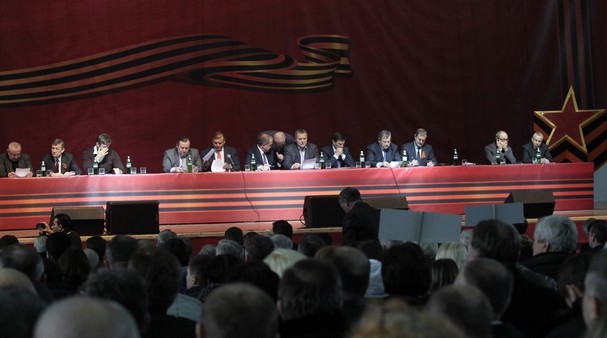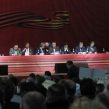
Moscow Encourages Centrifugal Forces in South-Eastern Ukraine
Publication: Eurasia Daily Monitor Volume: 11 Issue: 36
By:

Turning Ukraine into a federation of regional units is an idea that Moscow airs almost predictably, when facing a net loss of Russian influence over Ukraine. “Federalizing” Ukraine traditionally connotes, from Moscow’s perspective, undermining the authority of the central government in Kyiv in relation to the east and south of the country, where industry and the Russophone population are concentrated. A “federal” setup in that sense could open ample scope for Russia to retain and even cement its influence over Ukraine as a whole. Ukraine’s Party of Regions, based largely in the east and south, has but few supporters of federalization in its ranks. However, federalization proposals can gain some traction during acute crises of central governance in Kyiv, such as in 2004 and now.
As anti-government actions gained momentum in Kyiv, spreading to western and even central Ukrainian oblasts in recent weeks, and President Viktor Yanukovych’s government could not control the situation, Moscow’s state-controlled media resurrected the idea of a federalized Ukraine. This time around it implied protecting the east and south from a spillover of the processes under way in Kyiv and the west of the country. Yet, Ukraine’s Ministry of Foreign Affairs, Donetsk oblast governor Andriy Shyshatskyy, and former president Leonid Kuchma, among others, spoke out against any “federalization” experiments (Interfax-Ukraine, UNIAN, February 10, 13).
Moscow next encouraged a grouping of centrifugal forces in Kharkiv. This move indicated that Russia was no longer betting only, or mainly, on Yanukovych. In Kharkiv, oblast governor Mikhailo Dobkin and city mayor Hennady Kernes had launched on February 1 a “Ukrainian Front” with the declared goal to contain the anti-government movement in the country and to rally other regions to this initiative. The Ukrainian Front’s leaders soon lost confidence in Yanukovych and concluded that Kyiv as such had “exhausted its capacity to govern the country” (Interfax-Ukraine, February 13, 20). They announced plans to form a “national guard” and convened a “congress of people’s deputies of all levels” (oblast, district, and city-level) from Ukraine’s east and south, for February 22 in Kharkiv. That type of forum exists since the final Soviet years, is convened rarely and then for major initiatives, and it usually implies challenging or bypassing the central authorities from some territorial base.
According to the organizers, some 3,500 delegates attended the Kharkiv congress. They were led by the heads of the oblast administrations (presidentially appointed), chairmen of oblast councils (popularly elected), and city mayors from the Kharkiv, Donetsk, Luhansk, and Dnipropetrovsk oblasts, the Crimea Autonomous Republic, and the special-status city Sevastopol. Those four oblasts are the most heavily industrialized in Ukraine and the main net donors to the state budget. The congress proceedings were held in Russian, the colors of the Russian military order of St. George were ubiquitous in the hall, and no Ukrainian symbols caught the eye on the videotape of the congress (https://www.moldnews.md/rus/news/65773).
Pre-coordinated with Moscow, the congress was previewed by Russian State Television (Rossiya TV, February 21) while the Russian government’s official newspaper interviewed the main drafter of the congress’s resolution (Rossiyskaya Gazeta, February 22). Mikhail Margelov and Aleksei Pushkov—chairmen, respectively, of the Federation Council’s and the Duma’s international relations committees—as well as the governors of four Russian oblasts bordering on Ukraine, and Russia’s general consul in Kharkiv, attended the congress as “observers.”
Held coincidentally on the same day when Yanukovych was deposed as president in Kyiv (February 22), the Kharkiv congress seems to have been planned in anticipation of such a course of events. Yanukovych was in Kharkiv on the day of the congress, but the organizers deemed him a liability and did not allow him to participate. Kharkiv’s Mayor Kernes declared that Yanukovych had vanished into history (UNIAN, February 23).
The congress adopted by unanimous vote the resolution prepared in advance. It ascertained the vacancy of the central executive power in Kyiv, and declared any decisions adopted by the Verkhovna Rada (national parliament) to be of doubtful legality and legitimacy. Pending restoration of the constitutional order and government in Kyiv and other parts of Ukraine, the Kharkiv congress called on local authorities at all levels to take over the responsibility for provision of security and law enforcement on their respective territories in the Kharkiv, Donetsk, Luhansk, and Dnipropetrovsk oblasts, Crimea and Sevastopol.
The congress also urged residents of these territories to assist the law enforcement authorities locally; claimed a right for oblast councils instead of central authorities to appoint executive officials; and recommended to Verkhovna Rada deputies to return from Kyiv to their electoral districts, according to the resolution (Novaya Gazeta, February 23).
Those last three points seemed to presage recruiting paramilitary groups to assist or supplant law enforcement in these territories; forestalling or pre-empting appointments from Kyiv to these oblasts’ authorities; and preventing the Verkhovna Rada from attaining a quorum, if the deputies returned to their districts.
The resolution as well as speakers at the congress avoided using the loaded term “federalization.” Instead they claimed that only a far-reaching (though vaguely defined) decentralization of power from Kyiv to these regions would help to hold the country together. The resolution’s main author, Vadym Kolesnichenko (a deputy to the Verkhovna Rada from the Party of Regions), describes himself as an expert on federalization, but prefers not to use the term in the Ukrainian political context: “The definition is unimportant, the content is what matters” (Rossiyskaya Gazeta, February 22).
More boldly, Pushkov warned that “a new and more acute political phase would begin in Ukraine, unless the [next] government in Kyiv heeds the regions’ voices.” Pushkov called for a “political settlement between Kyiv and the regions.” Margelov, stating that this congress was “long overdue” (a giveaway that he had supported it earlier), opined that “Russia should declare with full responsibility that it would not leave fraternal Ukraine in trouble, but would protect it.” Margelov and Pushkov implied that Ukraine’s return to the 1996 constitution as amended in 2004 can provide an opportunity for enlarging the regions’ powers and that it should be adopted by referendum, not in parliament. Ostensibly, “not to divide the country but to preserve it” (Interfax-Ukraine, Ekho Moskvy, February 22).
Whether Moscow is prepared to support centrifugal tendencies in Ukraine more openly, and to what extent, is too early to tell. Margelov and Pushkov are undoubtedly sharing directly with the Kremlin their assessments of the chances of such a Russian policy in Ukraine.




